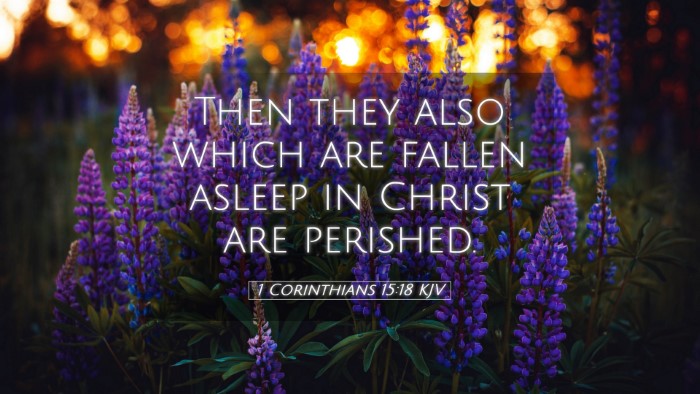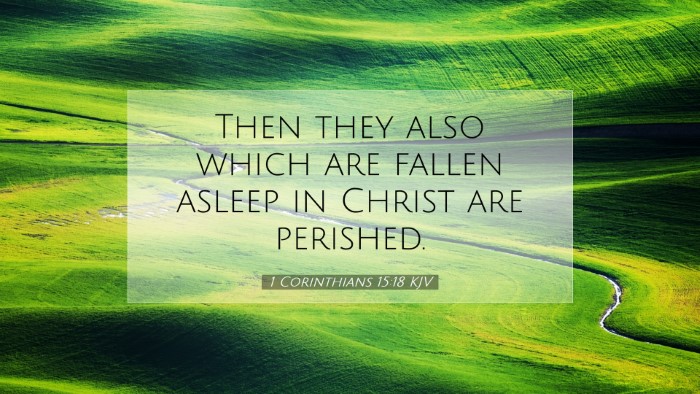Commentary on 1 Corinthians 15:18
Key Verse: "Then those also who have fallen asleep in Christ have perished."
Introduction
The verse 1 Corinthians 15:18 is a profound statement on the implications of the resurrection of Christ. In this passage, the Apostle Paul addresses the Corinthian church’s confusion regarding the resurrection and its significance for believers. This commentary synthesizes insights from various public domain commentaries to illuminate the depth of Paul's message.
Contextual Background
Paul wrote to the Corinthians amidst challenges regarding the resurrection. Many in the church questioned whether resurrection was possible, influenced by prevalent philosophical views. Paul’s argument stresses the necessity of the resurrection as foundational to the Christian faith. This verse serves as a critical point in his argument.
Exegesis of the Verse
In 1 Corinthians 15:18, the Apostle Paul argues for the reality of the resurrection with a poignant statement about the fate of those who have died in Christ if the resurrection from the dead does not occur. This condition underscores the importance of the resurrection for the hope of believers.
Matthew Henry’s Insights
Matthew Henry highlights the somber reality that if there is no resurrection, those who have died in Christ have lost everything. He emphasizes that the bittersweet nature of hope in Christ is diminished if the resurrection is a myth:
- "If there be no resurrection from the dead, then those who died in Christ are indeed gone forever."
- His remarks focus on the “perishing” aspect, elucidating that the physical death of believers would mean ultimate loss without the hope of resurrection.
Albert Barnes' Commentary
Albert Barnes elaborates on the theological implications of this verse, noting the dual nature of existence beyond physical death. He affirms that if resurrection is in question, it leads to despair:
- "The idea here is of the totality of loss—those who believed in Christ and died would face eternal separation from God."
- Barnes highlights that this verse encapsulates the essence of Christian hope, rooting it firmly in the reality of Christ's resurrection.
Adam Clarke’s Explanation
Adam Clarke approaches this verse with a more analytical lens, addressing the historical context of the early church’s struggles with resurrection beliefs:
- "Clarke suggests that the Greek philosophy of the time, which often dismissed bodily resurrection, has infiltrated the church's thinking."
- He also asserts that the significance of Jesus’ resurrection is pivotal, as it assures believers that death is not the end.
Theological Implications
The loss of hope in resurrection would mean that those who died in faith would have lived without purpose, burdened by the weight of despair. Paul’s assertion should serve as a clarion call to the church regarding the importance of holding fast to the truth of Christ's resurrection.
Hope and Comfort
This verse serves as a warning against the tragedy of loss of hope. Paul desired to bring comfort to the grieving Corinthians by affirming that death does not triumph over life in Christ. The resurrection assures believers of eternal life:
- Comfort for the Bereaved: Believers are comforted by the truth that those who have “fallen asleep” in Christ will awaken.
- Identity in Christ: This verse reinforces the Christian identity intertwined with the resurrection, an assurance that believers have eternal life beyond physical death.
Conclusion
In summary, 1 Corinthians 15:18 serves as a foundational reminder of the significant hope that resurrection offers to the believer. As Paul articulates, without this promise, faith wanes, and despair ensues. All commentary sources converge on the critical theme of resurrection as integral to the Christian faith, encouraging pastors, theologians, and all believers to hold firmly to this truth:
- The resurrection of Christ is not merely a dogma but the very essence of hope for believers.
- Those who have died in Christ have not perished; they await a glorious resurrection, a reality that binds the Christian community in faith and hope.


